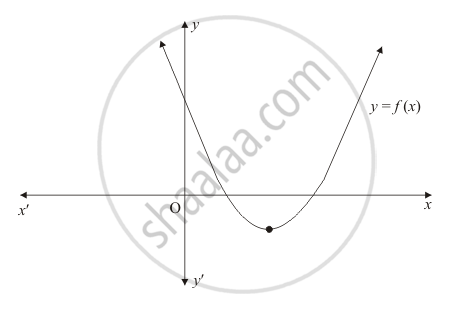Advertisements
Advertisements
प्रश्न
If a quadratic polynomial f(x) is a square of a linear polynomial, then its two zeros are coincident. (True/False).
उत्तर
The polynomial `f(x) = x62 = (x - 0)(x -0)` has two identical factors. The curve `y = x^2` cuts X axis at two coincident points that is exactly at one point.
Hence, quadratic polynomial `f(x)` is a square of linear polynomial then its two zeros are coincident. True .
APPEARS IN
संबंधित प्रश्न
A plane left 30 minutes late than its scheduled time and in order to reach the destination 1500 km away in time, it had to increase its speed by 100 km/h from the usual speed. Find its usual speed.
Write the family of quadratic polynomials having \[- \frac{1}{4}\] and 1 as its zeros.
If the product of zeros of the quadratic polynomial f(x) = x2 − 4x + k is 3, find the value of k.
The graph of the polynomial f(x) = ax2 + bx + c is as shown below (Fig. 2.19). Write the signs of 'a' and b2 − 4ac.

If one zero of the polynomial f(x) = (k2 + 4)x2 + 13x + 4k is reciprocal of the other, then k=
If the polynomial f(x) = ax3 + bx − c is divisible by the polynomial g(x) = x2 + bx + c, then ab =
State whether the given algebraic expression are polynomial? Justify.
`x^2 + 7x + 9`
Divide. Write the quotient and the remainder.
(21x4 − 14x2 + 7x) ÷ 7x3
The value of the polynomial 5x – 4x2 + 3, when x = –1 is ______.
If a polynomial p(x) is given by p(x) = x2 - 5x + 6, then the value of p(1) + p(4) is ______.
